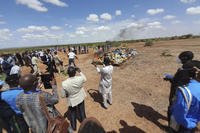Secretary of State John Kerry will meet with Russian Foreign Minister Sergey Lavrov to discuss the crisis in Ukraine on Wednesday, a day after the U.S. escalated a war of words with Russian President Vladimir Putin over Moscow's military intervention in Crimea.
Kerry and Lavrov are expected to meet on the sidelines of a long-planned conference on Syrian refugees, which is likely to be overshadowed by ongoing tensions in Ukraine.
The top diplomats from Russia, Ukraine, the U.S., Britain and France are not necessarily all at the same table, but French Foreign Minister Laurent Fabius said everyone has been working non-stop for a diplomatic solution over the crisis in Ukraine.
Lavrov, speaking in Spain ahead of meetings planned with Kerry, warned against Western support of what Moscow views as a coup.
"If we indulge those who are trying to rule our great, kind historic neighbor, we must understand that a bad example is infectious," Lavrov said.
Meanwhile, Russian lawmakers were working on a draft law to allow the confiscation of property, assets and accounts of European or U.S. companies if sanctions are imposed on Russia, RIA news agency said, according to Reuters.
The news agency quoted Andrei Klishas, head of the constitutional legislation committee in the upper parliament house, as saying the bill "would offer the president and government opportunities to defend our sovereignty from threats."
On Tuesday, Kerry met in Ukraine with the new government's acting president, prime minister, foreign minister and top parliamentary officials. Speaking to reporters afterward, Kerry urged Putin to stand down and said the U.S. is looking for ways to de-escalate the mounting tensions.
"It is clear that Russia has been working hard to create a pretext for being able to invade further," Kerry said. "It is not appropriate to invade a country, and at the end of a barrel of a gun dictate what you are trying to achieve."
In Washington, President Obama said his administration's push to punish Putin put the U.S. on "the side of history that, I think, more and more people around the world deeply believe in, the principle that a sovereign people, an independent people, are able to make their own decisions about their own lives. And, you know, Mr. Putin can throw a lot of words out there, but the facts on the ground indicate that right now he is not abiding by that principle."
Speaking at a fundraiser later Tuesday, Obama said it might be possible for the situation to "de-escalate in the next several days and weeks."
The Obama administration announced a $1 billion energy subsidy package in Washington as Kerry was arriving in Kiev. The fast-moving developments came as the United States readied economic sanctions amid worries that Moscow was ready to stretch its military reach further into the mainland of the former Soviet republic.
Earlier Tuesday, Putin hammered away at his message that the West was to blame for Ukraine's turmoil, saying its actions were driving Ukraine into anarchy. He warned that any sanctions the United States and European Union place on Russia will backfire.
American threats of punitive measures are "failure to enforce its will and its vision of the right and wrong side of history," Russia's Foreign Ministry said — a swipe at Obama's statement a day earlier that Russia was "on the wrong side of history."
The Obama administration, meanwhile, said it will boycott the Sochi G-8 summit unless Moscow reverses its position on Ukraine, according to Reuters, which cited a senior administration official.
Russia took over the strategic Crimean Peninsula on Saturday, placing its troops around its ferry, military bases and border posts. Two Ukrainian warships remained anchored in the Crimean port of Sevastopol, blocked from leaving by Russian ships.
On Wednesday, tensions remained high as Russian forces seized two Ukrainian missile defense battalions in Crimea, Reuters reported, citing an Interfax news agency report. The Ukrainian Defense Ministry was unable immediately to confirm on the report.
In Donetsk, the home city of outsted president Viktor Yanukovich, police said they were evacuating a government building occupied since Monday by pro-Russian demonstrators, according to Reuters.
Witnesses told the news agency a Russian flag on the roof of the building was replaced with a Ukrainian flag, but another Russian flag was still flying from a flagpole in front.
In other developments:
• Laurent Fabius, the French foreign minister, said European Union leaders meeting in Brussels on Thursday could decide on sanctions against Russia if there is no "de-escalation" by then, Reuters reported.
• The head of the European Union's executive arm says the bloc is ready to provide Ukraine an 11 billion euros ($15 billion) aid package in loans and grants over the coming years.
• NATO alliance on Tuesday accused Russia of continued violations of its international commitments and Ukraine's sovereignty and said it will directly confront Moscow with the allegations during a special meeting on Wednesday.
• Kerry said it was “incredibly moving” to visit the sites where dozens of protesters were killed during anti-government demonstrations that led to Yanukovych’s ouster.
Speaking from his residence outside Moscow on Tuesday, Putin said he still considers Yanukovych to be Ukraine's leader and hopes Russia won't need to use force in predominantly Russian-speaking eastern Ukraine.
Putin pulled his forces back from the Ukrainian border on Tuesday, yet said that Moscow reserves the right to use all means to protect Russians in the country but hopes it doesn't have to. Putin warned that any sanctions the West might place on Russia for its actions there will backfire.
-- The Associated Press contributed to this report.



























